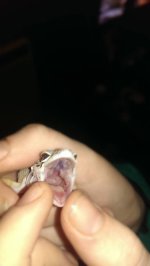I will do my best to try and explain this too you so that it makes sense. It is not realistic to say that my baby leo has MBD but is otherwise healthy. It is kind of like saying I have cancer but am otherwise healthy. MBD is more complicated than just some minor bone deformations. There are no cut and dry answers to heath once MBD is present. For example, lets say the animal has a slightly deformed jaw, this could lead to mouth rot because the jaws do not close properly allowing moisture or foreign particles to get in the mouth. Conditions can continue to worsen as the animal grows. It is honorable that you have rescued some Leos in an attempt to provide a better quality of life but in the end the final outcome may be out of your control.
Below is an excerpt from a vet that might do a better job explaining the complications that can be associated with MBD.
"Disease syndromes such as scoliosis may worsen as the animal grows and ages, and can lead to complications involving the nerves of the spinal column. Reptiles whose bone structure is altered by the disease, such as lizards with a rounded lower jaw or turtles with a misshapen shell, will not usually regain normal conformation.
Treatment is usually long term and may be life long. Follow-up veterinary visits are usually required, and may involve blood tests to assess changes in calcium and phosphorus levels and organ function, and radiographs to assess changes in bone density or fracture healing.
Some individuals will have such long standing disease that recovery will require months. Some will be so severely affected that they will be unable to attain an acceptable quality of life, no matter the quality and length of care they receive. Other pet reptiles will experience such severe consequences of MBD, such as a broken back, that they cannot reasonably be treated. Some animals will be too weak to withstand potentially life saving procedures, as in cases where anaesthesia is required. Individuals of certain species may be unable to cope with long term treatment, and in light of an already stressed immune system, may fail to respond to therapy. For such individuals, euthanasia may be the only fair choice.
MBD and its consequences can have life long effects, such as compromised kidney function and stunted growth. Constant attention will be necessary to the reptile's dietary and environmental needs."


